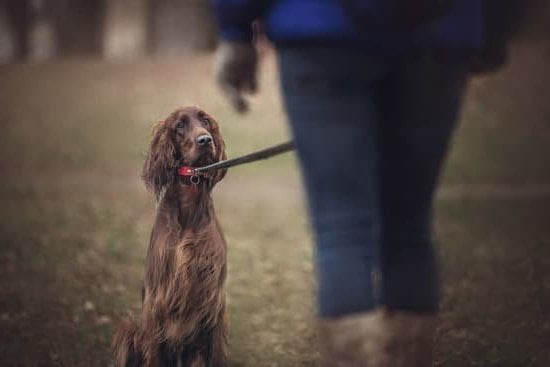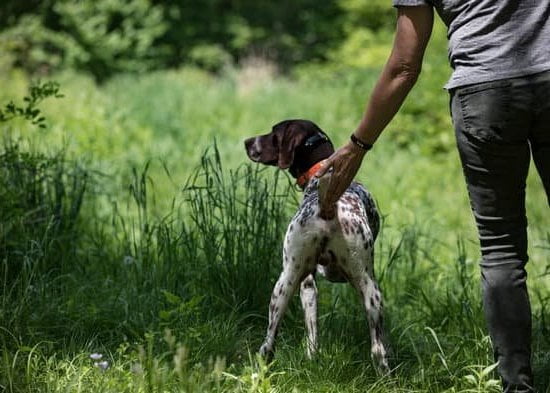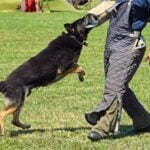Interested in training your dog to be a police dog? The idea of having a loyal, well-trained canine companion by your side may be appealing, but the process of training a dog for law enforcement duties is not as simple as it may seem. In this article, we will explore the ins and outs of police dog training, including the traits needed for successful training, finding the right program, and the responsibilities of a police dog handler.
Police dogs play a crucial role in law enforcement, assisting officers in various tasks such as detecting narcotics, apprehending suspects, and searching for evidence. They require specific breeds and temperaments to handle these tasks effectively. While many canines have the potential to become police dogs, not all are suitable for the rigorous training and demanding work involved.
Finding the right training program for police dog training is essential, as it will determine how well your dog adapts to its role as a law enforcement companion. We will delve into the process of finding a reputable program that fits your needs and your dog’s capabilities. Additionally, we will discuss the certification and testing process required for a police dog to serve in an official capacity.
Can you train your own dog to be a police dog? We will weigh the pros and cons of this approach so that you can make an informed decision on whether it is feasible for you and your canine companion. Stay tuned as we embark on this journey to understand what it takes to train your beloved pet to be a valued member of law enforcement.
What Breeds Are Suitable for Police Dog Training?
Working Dog Breeds
Certain breeds are naturally more suited for police dog training due to their physical and behavioral traits. Working dog breeds such as German Shepherds, Belgian Malinois, Rottweilers, Doberman Pinschers, and Labrador Retrievers are often selected for police dog training programs. These breeds possess the necessary strength, agility, intelligence, and trainability required for the demanding role of a police dog.
Temperament and Traits
When considering what breeds are suitable for police dog training, temperament and traits play a crucial role. Police dogs need to exhibit confidence, courage, loyalty, strong work ethic, and a high level of energy. Additionally, they must be socialized properly from an early age to ensure they can interact safely with the public and other animals while on duty.
Health Considerations
Apart from behavioral and physical characteristics, health considerations are also important when choosing a breed for police dog training. Breeds that are prone to hip dysplasia or other hereditary health issues may not be suitable for the rigorous demands of police work. It is essential to select a breed with a robust constitution and good overall health to ensure they can perform their duties effectively without compromising their well-being.
The Physical and Behavioral Traits Needed for Police Dog Training
When it comes to police dog training, certain physical and behavioral traits are essential for a dog to be successful in this role. One of the most important physical traits is strength and endurance. Police dogs need to be able to run, jump, and work for long periods of time without getting tired.
Additionally, they need to have a strong sense of smell, excellent hearing, and good eyesight. These physical attributes are crucial for tasks such as tracking suspects or detecting illegal substances.
In terms of behavioral traits, police dogs must be highly intelligent and trainable. They need to be able to quickly learn commands and follow them even in high-pressure situations. Moreover, they must have a strong work ethic and the drive to complete tasks with determination. Finally, a good police dog should also be confident, brave, and assertive without being overly aggressive.
A study conducted by the US Department of Justice found that the most common breeds used in police dog training are German Shepherds, Belgian Malinois, Dutch Shepherds, and occasionally Rottweilers. These breeds possess the necessary physical and behavioral traits required for this type of work. However, mixed-breed dogs can also excel in police dog training if they meet the essential criteria needed for the job.
| Physical Traits | Behavioral Traits |
|---|---|
| Strength and Endurance | Intelligence |
| Sense of Smell | Trainability |
| Hearing | Work Ethic |
Finding the Right Training Program for Police Dog Training
Researching Training Programs
When it comes to finding the right training program for police dog training, it’s essential to do thorough research. Look for reputable and experienced trainers who have a background in working with police dogs specifically. It’s important to find a program that focuses on obedience, agility, scent detection, and other skills necessary for police work. Additionally, consider programs that are affiliated with law enforcement agencies or organizations dedicated to police dog training.
Evaluating Training Methods
Before enrolling your dog in a training program, take the time to evaluate the methods used by the trainers. Positive reinforcement methods are generally recommended for police dog training, as it helps build a strong bond between the handler and the dog. Avoid programs that rely on harsh punishment or forceful techniques, as these can have a negative impact on your dog’s behavior and well-being.
Considering Specialized Training
Depending on the specific role you envision for your dog in law enforcement, you may want to consider specialized training programs. Some dogs may be trained for narcotics detection, while others may specialize in search and rescue operations. Consider your dog’s natural abilities and interests when choosing a training program, as this will increase their chances of success in becoming a police dog.
The Process of Training a Dog to Become a Police Dog
Training a dog to become a police dog is a rigorous and demanding process that requires time, dedication, and the right training program. The process involves several stages that focus on developing the necessary skills and behaviors required for police work. Here are the key components of training a dog to become a police dog:
- Basic Obedience Training: The first step in training a police dog is to establish basic obedience commands such as sit, stay, heel, and come. These commands form the foundation for more advanced training and are essential for effective communication between the handler and the dog.
- Agility Training: Police dogs need to be agile and physically capable of navigating various obstacles. Agility training helps to develop the dog’s physical strength, coordination, and ability to maneuver through different environments.
- Scent Detection Training: One of the most crucial aspects of police dog training is scent detection. Dogs are trained to detect specific odors such as drugs, explosives, or missing persons. This specialized training involves teaching the dog to indicate when they have found the target scent.
After completing these foundational training stages, the next phase involves more specialized instruction tailored to the specific duties that the police dog will perform. This typically includes tracking exercises, apprehension techniques, and scenario-based simulations to prepare the dog for real-life law enforcement work.
Overall, the process of training a dog to become a police dog requires consistent practice, clear communication between the handler and the canine, and adherence to established training protocols. It is important for individuals considering this type of training to seek out reputable programs with experienced instructors who understand what is required for successful police dog training.
The Responsibilities and Duties of a Police Dog Handler
A police dog handler, also known as a K-9 officer, plays a crucial role in the successful operation of a police dog. The main responsibility of a police dog handler is to care for and train their canine partner, as well as to utilize the dog’s skills in various law enforcement tasks. This includes maintaining the health and well-being of the dog, providing proper nutrition, grooming, and veterinary care.
In addition to caring for the dog, a police dog handler must also ensure that their canine partner is trained effectively for specific tasks such as tracking suspects, detecting narcotics or explosives, searching buildings and open areas, and protecting officers from harm. Handlers must continuously train alongside their dogs to maintain peak performance and ensure that they are ready to respond effectively to any situation.
Furthermore, police dog handlers are responsible for properly documenting the activities of their K-9 partners and ensuring that they adhere to departmental policies and procedures. This includes accurately recording the deployment of the police dog during operations, as well as maintaining records of training activities and certifications. It is essential for handlers to be detail-oriented in this aspect of their duties to provide accurate documentation for legal purposes.
| Responsibilities | Duties |
|---|---|
| Caring for the police dog’s health and well-being | Training the canine partner for specific law enforcement tasks |
| Documenting deployment activities | Maintaining records of training activities and certifications |
The Certification and Testing Process for Police Dogs
To become certified as a police dog, the K9 team must pass both written exams and practical assessments. These exams cover topics such as canine behavior, handling techniques, first aid for dogs, and legal considerations.
Practical assessments involve scenarios that test the dog’s response to commands, ability to track scents, and performance in simulated real-life situations. Additionally, the team may have to demonstrate their proficiency in specific tasks relevant to their area of specialization, such as narcotics detection or search and rescue.
Once certified, police dogs may be required to undergo periodic re-certification to ensure that they maintain their skills and stay up-to-date with any changes in training standards or procedures. This ongoing testing helps to guarantee that police dogs are consistently capable of performing their duties effectively while also promoting accountability within law enforcement agencies.
The certification and testing process ultimately play a vital role in maintaining the high standards expected of police dogs in various law enforcement roles.
Can I Train My Own Dog to Be a Police Dog
Training your own dog to be a police dog can be an appealing idea for many canine enthusiasts. However, it’s important to consider the pros and cons before embarking on this journey. One of the main advantages of training your own dog to be a police dog is the strong bond that develops between you and your canine partner. This bond can enhance communication and trust, which are crucial in police work.
Additionally, when you train your own dog, you have the opportunity to tailor the training program to suit both of your strengths and weaknesses. This level of personalization can lead to a more effective and efficient training process. Furthermore, by training your own dog, you have full knowledge of its temperament, behavior, and potential triggers, allowing you to better anticipate and address any difficulties during training.
However, there are also several drawbacks to consider when training your own dog to be a police dog. One major challenge is ensuring that your dog possesses the necessary physical and behavioral traits required for police work.
Additionally, without professional guidance from experienced trainers, there is a risk of improper training techniques or oversight in critical areas such as obedience, agility, and scent detection training. Lastly, handling a police-trained dog requires not only specific skills but also a significant time commitment for ongoing maintenance and development.
Conclusion
In conclusion, the possibility of training your own dog to be a police dog is certainly within reach, but it requires careful consideration and dedication. Understanding the specific physical and behavioral traits needed for police dog training, as well as the responsibilities and duties of a police dog handler, is essential before embarking on this journey.
The process of finding the right training program and undergoing the certification and testing process for police dogs is also crucial in ensuring that your dog meets the necessary standards.
While there are certainly potential benefits to training your own dog to be a police dog, such as the bond formed between handler and canine, it is important to consider the cons as well. This includes the rigorous training process, as well as the possibility that your dog may not possess the necessary traits or temperament required for this demanding role.
It is vital to consult with professional trainers and organizations in order to make an informed decision about whether your dog is suitable for such specialized training.
Ultimately, while it may be an ambitious goal to train your own dog to be a police dog, it is not impossible with dedication, proper resources, and guidance from experienced professionals. Whether pursuing this path or simply seeking further information on police dog training, it is important to weigh all considerations carefully before making any decisions regarding this specialized field of canine work.
Frequently Asked Questions
Can Any Dog Breed Be a Police Dog?
Not every dog breed is suitable to be a police dog. Certain breeds have the necessary characteristics and traits that make them well-suited for police work, such as German Shepherds, Belgian Malinois, and Labrador Retrievers. These breeds are chosen for their intelligence, agility, strength, and trainability.
What Training Method Is Used to Train Police Dogs?
The most common training method used to train police dogs is positive reinforcement. This involves rewarding the dog with treats or praise when they exhibit the desired behavior or complete a task correctly. This method helps to create a strong bond between the handler and the dog, as well as motivates the dog to perform their duties effectively.
Is It OK to Pet Police Dogs?
It is generally not okay to pet police dogs while they are on duty. Police dogs are working animals and should not be distracted from their tasks by well-meaning individuals who want to pet them.
It’s important to respect the role these dogs play in law enforcement and allow them to focus on their responsibilities without unnecessary interactions from others.

Welcome to the blog! I am a professional dog trainer and have been working with dogs for many years. In this blog, I will be discussing various topics related to dog training, including tips, tricks, and advice. I hope you find this information helpful and informative. Thanks for reading!





